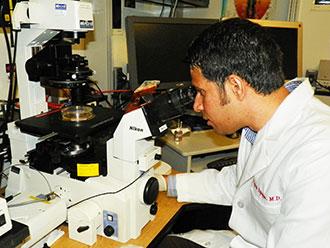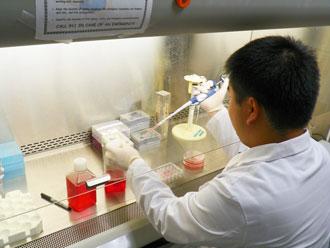
Some of the projects currently underway at the Children’s Brain Tumor Project are:
Children's Oncology Group Weill Cornell is a member of the Children’s Oncology Group (COG), a collaboration that includes more than 8,000 childhood cancer experts at more than 200 institutions worldwide. Dr. Mark Souweidane and Dr. Prajwal Rajappa (shown at right) head up the Weill Cornell Pediatric Brain and Spine Center’s participation in a long-term study of brain tumor tissue samples collected from pediatric patients around the world. This brain tumor protocol allows us access to tissue and accompanying blood samples, so we can conduct laboratory tests on them to help us understand the biology of pediatric brain tumors.
Genomics/Gene Sequencing One of the reasons pediatric brain tumors are so difficult to study is that there simply aren’t enough cases to provide a wide range of samples. That makes it even more important to conduct genomic sequencing, to extract the maximum information possible from a small number of samples. The Thalamic Glioma Registry will focus on gathering more samples to generate even more data.
Elucidating Mechanisms of Histone H3.3 Mutants-Mediated Oncogenesis in Pediatric Brain Cancers We are conducting this project in collaboration with The Rockefeller University and Memorial Sloan-Kettering. C. David Allis, Ph.D., of The Rockefeller University is the Principal Investigator; Dr. Greenfield is one of the co-principal investigators. The project is investigating how histone H3.3 mutations affect the epigenetic landscape to mediate the development of pediatric gliomas. The goal of the study is to generate novel insight about pediatric gliomagenesis, streamline clinical translation of pediatric glioma treatment, and identify novel therapeutic strategies.

Characterizing and Targeting Bone Marrow-Derived Inflammatory Cells in Driving the Malignancy and Progression of Childhood Astrocytic Brain Tumors
This project is directed by Dr. Yujie Huang (shown at right) in Dr. Greenfield’s lab. The project will investigate what causes some low-grade gliomas to progress into high-grade tumors, and what inhibitor drugs can be used to stop the neovascularization — fed by signals from the bone marrow — that allows that growth. The research will use mouse models to demonstrate that the bone marrow is indeed “recruiting” the cells that drive those new blood vessels to form, and that using inhibitor drugs can successfully delay disease progression by impeding this process.
Clinical Trials
We also have two clinical trials enrolling patients diagnosed with rare and inoperable brain tumors. Find out more about our clinical trials for pediatric brain tumors.

